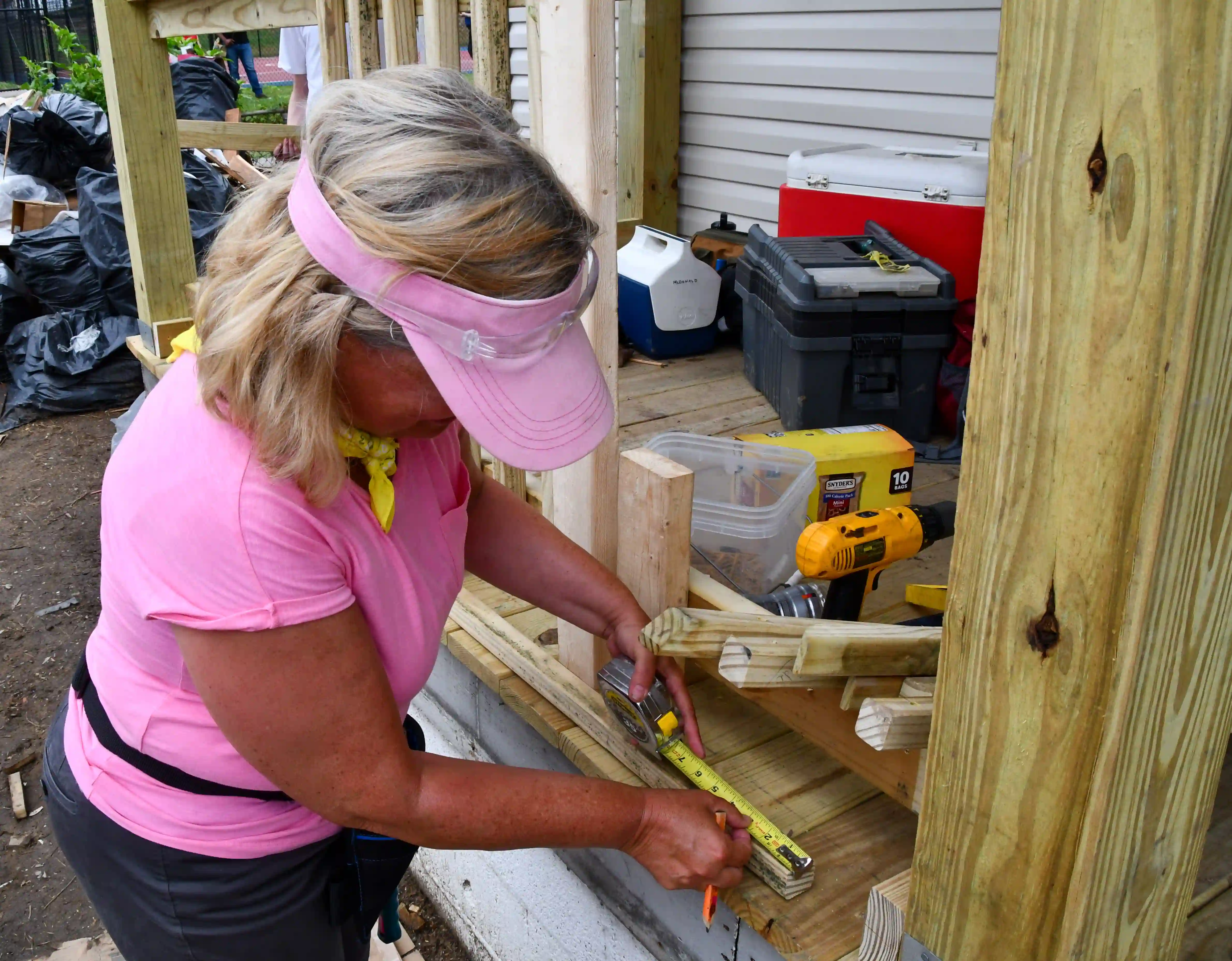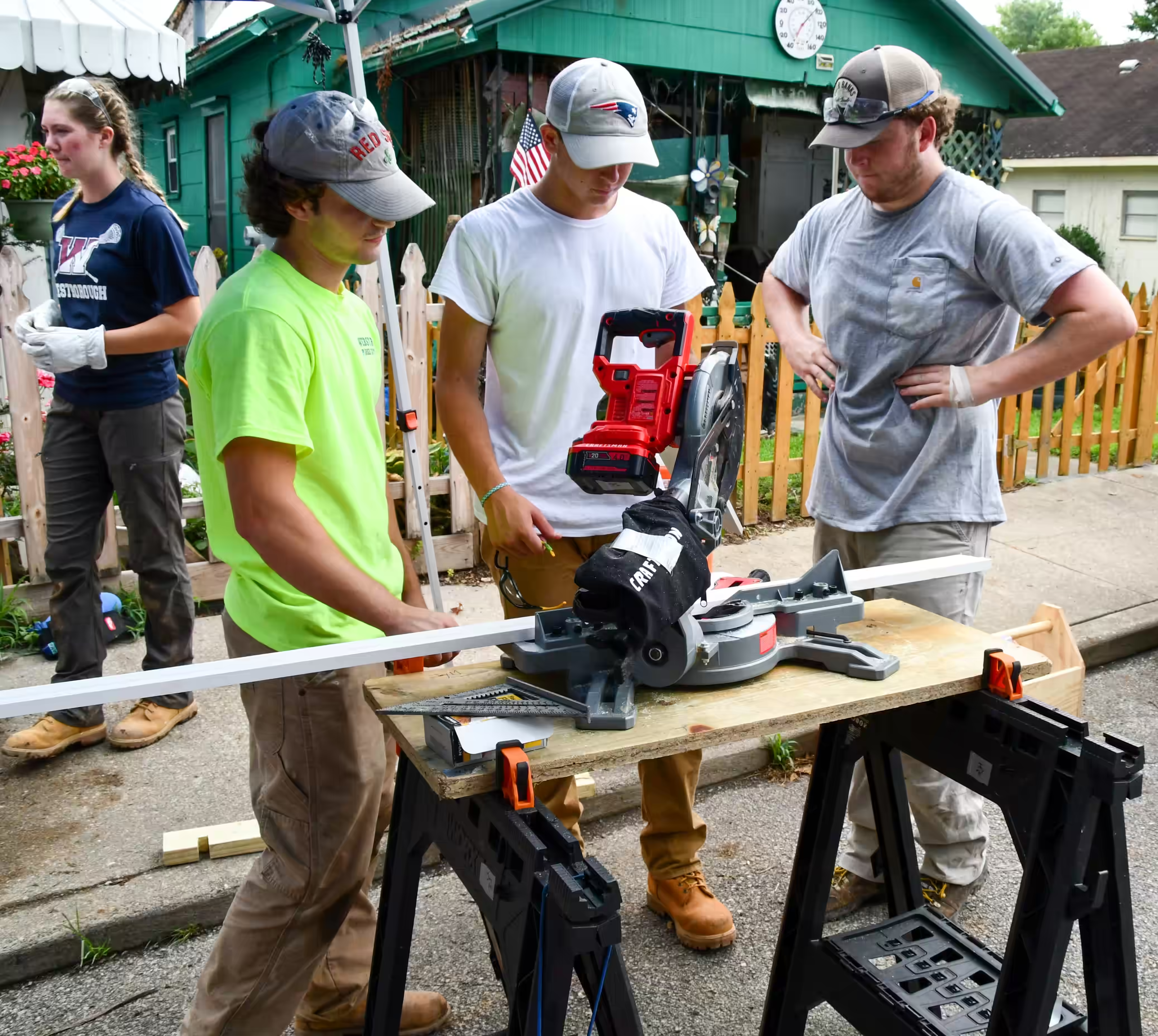
Appalachia Service Project
ASP Repairs Homes, Builds Relationships
Miss Willie sits in a wheelchair on her front porch as teens in toolbelts scurry past her. She struggles to speak over the sounds of hammers and circular saws, but her eyes glimmer with hope.
The Charleston woman has dealt with a lot of issues lately, including a recent cancer diagnosis and related surgery. Now, her beloved home is getting some much-needed attention from the Appalachia Service Project, including all-new siding and a handicap-accessible bathroom.
“I was rushed to the hospital, but shortly before that, they figured out I have stomach cancer,” Miss Willie said. “They took me into emergency surgery and managed to get most of the cancer, which was infused into the pancreas. But each day is getting better.”
ASP is a non-profit organization based in Johnson City, Tennessee, that provides critical home repair services to low-income homeowners throughout Appalachia. In 2024, ASP volunteers served communities in Charleston and Wyoming County, serving dozens of individuals and families by installing or repairing electrical or plumbing systems, bathrooms, kitchens, porches, roofs, siding, and other necessary fixes. ASP’s work in West Virginia is largely funded by grants, including more than $100,000 from the West Virginia Housing Development Fund’s Affordable Housing Fund.
“There is a good amount of grant funding here in Charleston and throughout West Virginia,” said Melisa Winburn, ASP’s CEO. “What that means, to put it into context is that we are able to do a flip on Beatrice Street, which we’ve never been able to do before. We can double the amount of money that goes into homes in this area than we can in areas where we don’t have the same sort of partnerships. What that means is we can lift more homes out of substandard conditions.”
While ASP primarily focuses on repairing existing homes, the organization also acknowledges there is a shortage of suitable housing in the areas it serves. In 2019, the organization’s volunteers built a new home for a fire victim on the West Side. This year, they turned their attention to an abandoned property donated by the City of Charleston’s Land Reuse Agency.


- $100,000: Permanent Gap Rental for Repairs/Rebuilds
- $10,000: Organizational Technical Assistance
- ASP is 90% grant-funded in West Virginia
- 125-175 projects spread across 15 homes
- 45-50 individuals and families served
- 570 volunteers from as far away as Illinois, Massachusetts, and New Jersey

“We essentially started from scratch, completely demoing the inside and taking it down to the studs,” said Samantha Humphrey, ASP’s Kanawha County Center Director. “We removed asbestos siding from the outside. We did a tin overlay over the existing roof, and we are completely putting it back together.”
The home will also have new siding, a new front and back porch, all new plumbing, electrical, and HVAC systems, new appliances, and kitchen cabinets.
ASP is working with the Religious Coalition for Community Renewal, a Charleston-based housing organization that also receives some funding from WVHDF, to identify a new homeowner to take the keys to this completely renovated property. If all goes well, this project could set the stage for more housing preservation in the future.
“This is serving as a pilot for us here in Charleston, and our hope moving forward is that we can do one or two each summer once we have a system in place,” said Annalee Posey, ASP’s Assistant Director of Home Repair. “We know it’s really important to the people here and to the Land Reuse Agency and many others to preserve as many structures already in place as possible, so that is a new way we think we can partner with the City of Charleston and other funders is to continue doing projects like this.”
ASP’s work is driven by volunteers, mostly 15 to 19 years old, led by adults with home repair experience. Each year, more than 15,000 volunteers serve throughout Central Appalachia, a region identified as having both a high rate of poverty and high rate of substandard housing. Most volunteers come from states outside of Appalachia and use their construction skills to make homes warmer, safer, and drier while forging relationships with homeowners like Miss Willie.
“We are invited into communities, welcomed by great partners, then we are just neighbors connecting neighbors—your neighbors may just live 900 miles away from you,” Winburn said. “They come and are inspired to love and care about this region in the same way that we are. These are life-changing things.”
Habitat For Humanity
In 2024, Habitat for Humanity of the Tri-State welcomed the Meadows/Lilly family into their new home in Huntington’s Guyandotte neighborhood just in time for the holidays. This marks Habitat Tri-State’s 154th completed home, and thanks to continued support and funding, more are on the way.
Learn More